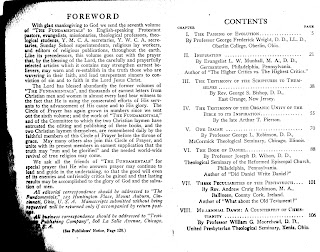実は先日『聖書信仰と諸問題』を購入しました。
この書はいま解説している『聖書信仰』をかなり意識して出版された本です。
今後の解説は、表立って言及はしないと思いますが、多少なりともこの『聖書信仰と諸問題』を意識して書き進めることになるかと思います。
さて 、今回扱う6章「ファンダメンタリズム」は脚注も入れると20ページあり、少し長いので2回に分けようと思います。
6章 「ファンダメンタリズム」(88-108)
A 「英米ー明らかに異なる二つの流れ」(88-94)
イントロに
・・・1920年代、保守的な神学者たちが宣言した「五つのファンダメンタル」となった。後の十二冊からなるトラクトシリーズ『ファンダメンタルズ』は、篤志家の協力を得て、無料で全世界に三百万部供給されたが、自由主義に対抗するファンダメンタリズムの基本的な教えを説明している。(88ページ)とあるのですが、恐らく名前としてはその存在を知っている人でも、「現物」を所有していたり、見たことのある人は少ないかもしれません。(ネットには画像がありますが・・・。)
実はこの『ファンダメンタルズ』のⅦとⅧは筆者が(確か)このことと縁の深い某神学校の古本市で入手したものです。(一冊が25セントでした。)
ついでに目次のところをスキャンしたものをお見せします。
前々から「自慢したかった」のですが機会がなかった。(一体何の自慢になるのだ、と言われそうですがやはり「歴史」を証言するハードな証拠をもっていることはそれなりに・・・。)
さて、英米での違いを浮き彫りにする「証言」として、ジェームズ・オアが紹介されています。(90ページ)
神の啓示の書物としての聖書を守ろうとして「微細なデータに至るまで聖書には『誤りがない』と実証しなければ、啓示宗教への信頼全体が崩れてしまうとまで主張するのは、きわめて自殺的な行為である。」と引用しています。
脚注によると、この引用は『啓示と霊感(Revelation and Inspiration)』(1910年)からだそうです。(リンクはオアーの著作の全文、フリーです。)
以下は周辺も含めた原文の引用ですが、オアの議論は「霊感の教理」は「啓示の事実・真実」に基づくのでありその逆ではない、というものです。
もしそれを逆転させて、しかも「無誤論」のような形で「キリスト教の真理性」を主張・証明しようとするならば、もしそれが実証されない時、「無誤論」とともに「キリスト教の真理性」の主張まで崩壊してしまう、という危惧に聞こえます。
オアが「the right method」に対して「The older method」と呼んでいる「霊感を先に論証することで啓示を証明する」アプローチのいわば名残のようなものとして「無誤論」が紹介されています。
そしてこの「the right method」を取るならば「無誤論」を必要としないことを「福音書」のケースに即して語っています。
福音書記者がたとい「霊感」されたとしなくても、彼らが記述した「人物」が、確かに「超自然的主張」をしそれが言葉と行いによって確かめられた「人物」として記録されているならば、(私たちは)福音書を通してその「人物」を信じることが出来るし、その方が「霊感された福音書を先ず信じた上でその人物を信じる」よりもはるかに無理がない。
「無誤な聖書」を主張していたホッジやウォーフィールドでさえ、「新約聖書」という「啓示の記録」より「イエス・キリストの啓示の事実」の方が先に存在し、そして仮に神が「完璧に無誤な啓示の記録」を与えなかったとしても、啓示の事実に基づくキリスト教は、そのような霊感された書物の存在に左右されずに成立したはずだ、と脚注[1]で言及しています。
I. Revelation and Inspiration — Their Relations.
1. It will have been seen that it is sought in the preceding pages to approach the subject of inspiration through that of revelation. This seems the right method to pursue. The doctrine of inspiration grows out of that of revelation, and can only be made intelligible through the latter. The older method was to prove first the inspiration (by historical evidence, miracles, claims of writers), then through that establish the revelation. This view still finds an echo in the note sometimes heard — ' If the inspiration of the Bible (commonly some theory of inspiration) be given up, what have we left to hold by ? ' It is urged, e.g., that unless we can demonstrate what is called the ' inerrancy' of the Biblical record, down even to its minutest details, the whole edifice of belief in revealed religion falls to the ground. This, on the face of it, is a most suicidal position for any defender of revelation to take up. It is certainly a much easier matter to prove the reality of a divine revelation in the history of Israel, or in Christ, than it is to prove the inerrant inspiration of every part of the record through which that revelation has come to us.
Grant the Gospels to be only ordinary historical documents — trustworthy records of the life of Christ, apart from any special inspiration in their authors — we should still, one may contend, be shut up as much as ever to the belief that the Person whose words and works they narrate was One who made super-human claims, and whose character, words, and deeds attested the truth of these claims. [1] It is assuredly easier to believe that Jesus spoke and acted in the way the Gospels declare Him to have done, than to prove that Mark and Luke possessed an exceptional inspiration in the composition of their writings — though, as has been already stated, there is the best reason for believing that they did.藤本氏は他にも「英米二つの流れ」の由来や背景を指摘していますが、やはりこの辺を丹念に検証しながら、聖書の性格や意義・役割を考えて行く必要があるのではないか、と思わされた次第です。
[1] This has often been put as strongly as it can be by the stoutest defenders of the infallibility of Scripture. Cf., e.g., Bannerman, Inspiration: the Infallible Truth and Divine Authority of the Holy Scriptures, pp, 18 ff. Drs. Hodge and Warfield, arguing for an 'errorless Scripture,' write: 'Nor should we ever allow it to be believed that the truth of Christianity depends upon any doctrine of inspiration whatever. Revelation came in large part before the record of it, and the Christian Church before the New Testament Scriptures. Inspiration can have no meaning if Christianity is not true, but Christianity would be true and divine, and being so, would stand, even if God had not been pleased to give us, in addition to his revelation of saving truth, an infallible record of that revelation absolutely errorless by means of inspiration' (Presby. R$v. t April 1881, p. 227).
(次回へ)



0 件のコメント:
コメントを投稿